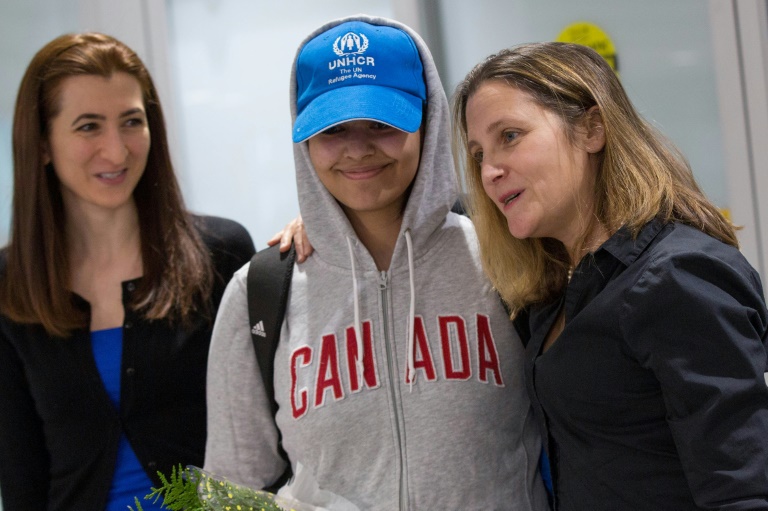
A “very, very happy” Saudi teenager who caused a sensation by defying her family and seeking asylum abroad was welcomed with open arms in Toronto Saturday at the end of a dramatic but exhausting international odyssey.
Foreign Minister Chrystia Freeland greeted Rahaf Mohammed al-Qunun after she landed in Toronto, wearing a skirt, a gray hoodie emblazoned in red with the word “CANADA” and a blue cap with the logo of the United Nations High Commissioner for Refugees (UNHCR).
Smiling broadly, the 18-year-old posed for photographers with Freeland at her side, but made no statement.
Later, she tweeted a video of her arrival, with the comment: “I love Canada I love you all.”
Freeland said Qunun “wanted Canadians to see that she’s here, that she’s well and that she is very, very happy to be in her new home.”
“She had a pretty long journey and is exhausted and prefers not to take questions for the moment,” the diplomatic chief added, with an arm around Qunun’s shoulder.
She was taken in by Toronto-based refugee group Costi, a spokeswoman said.
Shortly after her arrival, Qunun went shopping for some warm clothes in central Ontario, according to the spokesman, noting the teenager knows several people there and contacted them.
In the coming days, Costi representatives will help her open a bank account and perform various administrative tasks before finding her a permanent home.
In the meantime, she is staying in a facility constantly under guard. Costi has recommended Qunun that she avoid sharing her address.
A trail of tweets
The arrival in Canada marks the epilogue of an international saga.
Qunun captured the world’s attention with a trail of Twitter posts that ignited a #SaveRahaf movement as she fled what she said was physical and psychological abuse from her family in ultra-conservative Saudi Arabia.
Rights groups also said she had renounced Islam, risking prosecution in Saudi Arabia. Her family has denied the abuse allegations.
The publicity thwarted an attempt to deport her to Saudi Arabia after she arrived in Bangkok on a flight from Kuwait a week ago, with Thai authorities instead turning her over to the UN’s refugee agency.
Then on Friday, Prime Minister Justin Trudeau made the surprise announcement that Canada would welcome her.
Freeland said that in granting Qunun asylum, Canada was “standing up for human rights around the world, and we believe very strongly that women’s rights are human rights.”
The move is sure to further strain Canada’s relations with the kingdom. Ties went sideways last August over Ottawa’s rights criticism of Saudi Arabia, prompting Riyadh to expel the Canadian ambassador and sever all trade and investment ties in protest.
Canada also sparked fury in Riyadh by demanding the “immediate release” of jailed rights campaigners, including Samar Badawi, the sister of jailed blogger Raif Badawi, whose family lives in Quebec.
Qunun’s attempt to flee Saudi Arabia was embraced by rights groups as a beacon of defiance against repression.
‘Precarious situation’
“Ms al-Qunun’s plight has captured the world’s attention over the past few days, providing a glimpse into the precarious situation of millions of refugees worldwide,” said Filippo Grandi, the UN High Commissioner for Refugees.
“Refugee protection today is often under threat and cannot always be assured, but in this instance international refugee law and overriding values of humanity have prevailed.”
Raif Badawi’s wife Ensaf Haidar also praised Canada, calling Freeland on Twitter “the real hero” behind efforts to prevent Qunun’s repatriation to Saudi Arabia.
Qunun first said she was aiming for Australia. But late Friday, Thailand’s immigration police chief Surachate Hakparn said a smiling and cheerful Rahaf was bound for Toronto.
“The only country that really helped me in the end was Canada,” Qunun said after arriving in Toronto. “The rest were afraid and cowards.”
In a tweet, the UNHCR said: “We welcome Rahaf’s arrival in Canada and the Canadian Government’s decision to provide protection and a long-term solution for her there as a resettled refugee.”
Death threats
On Friday, Qunun posted a cryptic tweet on her profile saying, “I have some good news and some bad news.” Her account was deactivated shortly afterward in response to death threats she had faced, her friends said.
But she was back online later in the day, tweeting: “I would like to thank you people for supporting me and saving my life. Truly I have never dreamed of this love and support.”
She opened and began using a new Twitter handle on Friday, citing the threats.
Qunun’s use of Twitter saw her amass tens of thousands of followers within a week, highlighting her plight at a time when Saudi Arabia’s human rights record is under heavy scrutiny following the murder of journalist Jamal Khashoggi last year.
Her deployment of social media allowed her to avoid the fate of countless other refugees who are quietly sent back home or left to languish in Bangkok detention centers.
She refused to see her father, who traveled to Thailand and expressed opposition to her resettlement.




